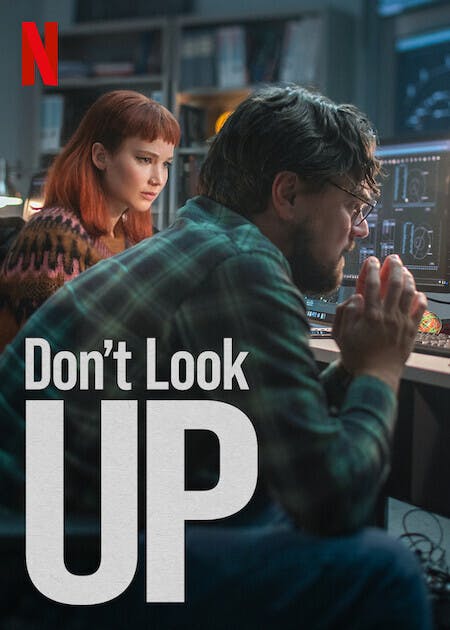“Don’t Look Up,” starring Leonardo DiCaprio and Jennifer Lawerence follows two astronomers from none other than MSU who made an Earth-shattering discovery: a comet is hurtling towards the planet. In the film, they have to go on a huge media tour to warn mankind of this phenomenon.
At first, DiCaprio and Lawrence's characters are not taken seriously because they are not from an overly prestigious school like Harvard or Yale. In fact, the president’s chief of staff, played by Jonah Hill, even scoffs "I'm sorry, did you say Michigan State?”
Another man replies, saying, "Exactly. They have an excellent astronomy department," to which Hill’s character teases, "If you say so.”
The notion that state schools are inferior to Ivy League universities in every way is prevalent in society, but the truth of the matter is that every school has something that it excels in and groundbreaking research can be and is done everywhere.
“When you think about all the astronomers and all the astrophysicists in the country, very few are from these name-brand universities, and most people are from state universities, public universities, small colleges,” postdoctoral research associate and astronomy instructor Abigail Stevens said. “The name brand universities take up a big mental space in the public's mind, but they occupy a fairly small space in terms of the actual professional community.”
While many can be offended by the status of MSU being nothing but a football school being conveyed in such a high-profile film, astronomy professor Mark Voit is not at all bothered by it.
“Just because Hollywood said, ‘Oh, low-level astronomers’ and everything doesn't mean we're going to be all upset about it,” Voit said. “In fact, I think the publicity is going to be a funny thing that we'll probably talk to our colleagues about for years.”
In fact, MSU astronomers hardly ever have to prove their competence after saying where they work. The only instance in which astronomy and astrophysics professor Megan Donahue has to do this is when she is challenged as a female scientist.
“I will admit, that’s where my undergraduate credentials have come in handy, especially when I was in my 20s and 30s,” Megan said in an email. “I might be asked, where did I get my degrees, and I’d say 'My undergraduate degree is in physics from MIT…' and I had a kind of instant credibility that I would not have had if I had gone to the University of Nebraska. That degree also takes the air out of the sails of those bad boys who are convinced they are smarter than everyone else.”
Even though the astronomers at MSU know their place and their department’s place in the field, the fact that MSU was chosen for this film was shocking.
“I mean typically you would expect an Ivy League university to be part of the movies, but getting MSU's astronomy department noticed is a good thing,” postdoctoral research associate Deovrat Prasad said.
Stevens is excited to watch the movie about how deep the MSU storyline runs in it.
“I'm curious if them being from MSU is anything more than just a punchline,” Stevens said. “I'm curious if any of our access to MSU facilities--like we have partial time on the telescope in Chile called SOAR—I'm wondering if this plays any role in it.”
In the film, DiCaprio plays Dr. Randall Mindy, an MSU astronomer, and Lawrence plays Dr. Kate Dibiasky, Mindy’s graduate student.
“It will be really exciting to watch such a great actress play a role that is so specific to my position here at MSU,” astronomy graduate student Adam Kawash said in an email. “I will definitely be watching to see if the performance is believable as a graduate student. There are definitely specific struggles that every graduate student encounters, and I am looking forward to seeing if the movie captures that.”
Although the film’s producers did not reach out to anyone at MSU about this movie, there are some major similarities between MSU’s real astronomy department and the film. For example, Mindy studies rarefied gas in galaxies, which is studied by astronomy professor Megan Donahue and Dibiasky studies supernovae, which is studied by several individuals in the department.
“There's some evidence that they looked into our astronomy department,” astronomy assistant professor Seth Jacobson said. “They gave.. Jennifer Lawrence's character and Leonardo DiCaprio’s character relevant research interests, and they sort of made it work with Michigan State, and that's pretty cool.”
The research of the protagonists is not the only similarity, though.
Support student media!
Please consider donating to The State News and help fund the future of journalism.
“The funny part is that the actors' makeup make them look distinctively like the certain two professors of the department,” postdoctoral research associate Kirill Sokolovsky said in an email. “I think it can't be just a coincidence. At the very least, the makeup artists googled the department website for an inspiration on how MSU astronomers may look like.”
There have been many movies over the past couple of decades that feature astronomy. For many astronomers, it is always interesting to see how accurately the movie portrays both the facts of astronomy and the lives of astronomers.
“When my wife and I go to (see these movies), we're there to be entertained, but we're also seeing how our field is being represented,” Voit said. "And sometimes it's screamingly unrealistic. And sometimes it's like, ‘Okay, I think they kind of captured it.’”
Postdoctoral research associate Elias Aydi agreed, citing the film “2012” as one that does not realistically play out in regards to the science behind it. He looks forward to finding out how accurate “Don’t Look Up” is.
“There are great movies where the science is accurate, like ‘Interstellar’. … so I'm curious to see if what they describe is accurate,” he said. “That would make the movie even better.”
Jacobson got the chance to see an early screening of the film. While watching, he realized that it is actually an allegory for climate change. Although this has not been confirmed by producers, he believes it is rather obvious due to parallels between the current climate change situation and the conflict in the film with distrust in science.
“You see the politicians, the news media and the multi-billionaire class all react in their own self interested ways that come with their own conflicts of interests that hinder the scientists, who are these MSU astronomers and a NASA official, who just want to solve this problem, which ultimately is solvable,” Jacobson said.
Physics and astronomy assistant professor Wolfgang Kerzendorf hopes that the audience takes something from this satirical allegory.
“I think what I hope the public will get out, and I think, especially in the current climate, and especially in the current sort of environment, (is) that science is not politics, and it's not out to get them,” Kerzendorf said.
Zepf hopes that “Don’t Look Up” allows the public to understand that extraordinary work is done at MSU, even if it's not a big-name school.
“Because of what I do, I hope that it sort of puts it in people's mindset that MSU is a major research university,” Zepf said. “Even if it's just a movie, it is actually possible that real discoveries are actually made on campus here by students and faculty.”
Discussion
Share and discuss “Hollywood goes green: Astronomy department discusses film 'Don't Look Up' ” on social media.







